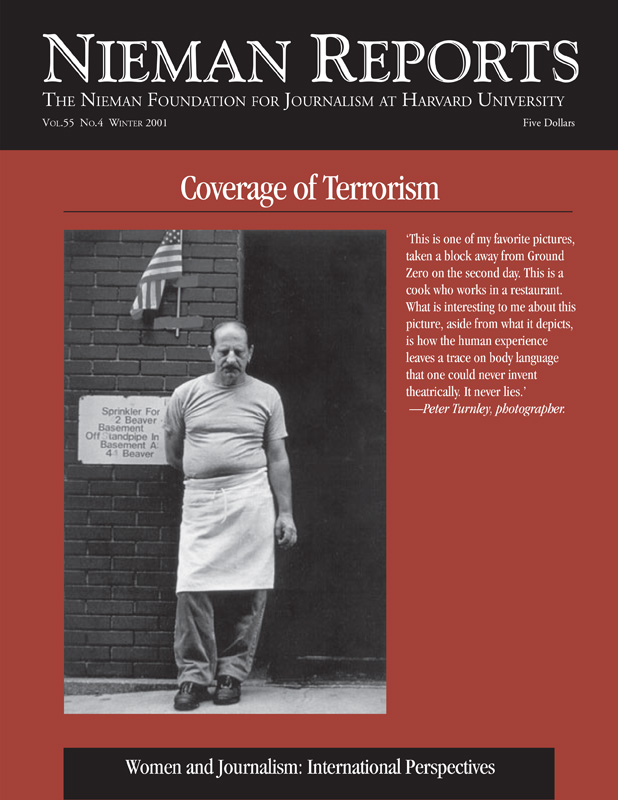As journalists reflect on the lessons of September 11, they are likely to conclude that foreign news coverage must be improved. Walter Isaacson, chairman of CNN, has told David Shaw of the Los Angeles Times that the terrorist attacks helped his network rediscover “the vital importance…to cover international news in a serious way.”
But what does it mean to cover international news in a serious way? Foreign news is expensive, but that’s only part of the reason for its well-documented decline. News executives also assume that people aren’t interested in news unless it affects them personally. And if people aren’t interested, the thinking goes, news organizations that invest dollars, time and space in reporting foreign news will discover their audience is disappearing. Given these assumptions, what kind of foreign coverage can news organizations afford if they believe there is value in providing audiences with a better understanding of the world?
If the emerging model of international coverage means only more news about terrorism here, there and everywhere, it won’t be the right one. If it only means more about war, social unrest, and ferries sinking, news organizations ought to save their money.
At home, when journalists want to tell readers and viewers about Christianity in America, they don’t confine their coverage to the Branch Davidian and other extremist sects. Stories about education don’t begin and end with kids shooting up their classrooms, and reporting on deep-seated concerns about abortion isn’t limited to coverage of the Army of God.
Journalists take a much broader view. And that is what I’m arguing for in foreign news coverage. The way to give Americans understanding about how the rest of the world lives and why it does so and how these things came to be is to provide international coverage, over the long haul, that reflects the same values that are given to reporting news at home.
Begin by throwing away the notion that every foreign story that isn’t about a war has to have a local peg. We miss a lot of important stories because of this assumption. Take the Asian money crisis of 1997 that went largely unreported until it reached pandemic proportions. It was simply beyond the press to report on the early fluctuations of the Thai baht in ways that connected to Main Street.
I tell my students to heed the message of John Donne, who observed that no man is an island. That is, sooner or later what happens to anybody else—down the street or thousands of miles away, in a country whose name we can barely pronounce—affects us. I tell them good journalists are involved in humankind. If they aren’t, they will never be able to write about the world in ways that touch readers nor be able to learn anything about themselves.
At this point, you may be wondering how American journalism can accommodate this enlarged mission. Here are a few suggestions.
Our foreign news coverage has deteriorated shamefully. As Shaw reports, “newspaper editors and television news executives have reduced the space and time devoted to foreign news covered by 70 percent to 80 percent during the past 15 to 20 years.” The events of September 11 and thereafter instruct us that this is not acceptable.
With regards to international news, the media today find themselves in the situation of the drunk who breaks into a cold sweat as he sobers up. He remembers that he just sped dead blotto through a crowded school zone. He swears, never again. He determines to live his life in a “serious way.”
But now it’s tomorrow. Does he head back to the saloon? Or does he begin a new and more responsible life? Like him, journalists, too, have a choice.
William F. Woo, a 1967 Nieman Fellow, has taught journalism at Stanford University since 1996. He formerly was editor of the St. Louis Post-Dispatch.
But what does it mean to cover international news in a serious way? Foreign news is expensive, but that’s only part of the reason for its well-documented decline. News executives also assume that people aren’t interested in news unless it affects them personally. And if people aren’t interested, the thinking goes, news organizations that invest dollars, time and space in reporting foreign news will discover their audience is disappearing. Given these assumptions, what kind of foreign coverage can news organizations afford if they believe there is value in providing audiences with a better understanding of the world?
If the emerging model of international coverage means only more news about terrorism here, there and everywhere, it won’t be the right one. If it only means more about war, social unrest, and ferries sinking, news organizations ought to save their money.
At home, when journalists want to tell readers and viewers about Christianity in America, they don’t confine their coverage to the Branch Davidian and other extremist sects. Stories about education don’t begin and end with kids shooting up their classrooms, and reporting on deep-seated concerns about abortion isn’t limited to coverage of the Army of God.
Journalists take a much broader view. And that is what I’m arguing for in foreign news coverage. The way to give Americans understanding about how the rest of the world lives and why it does so and how these things came to be is to provide international coverage, over the long haul, that reflects the same values that are given to reporting news at home.
Begin by throwing away the notion that every foreign story that isn’t about a war has to have a local peg. We miss a lot of important stories because of this assumption. Take the Asian money crisis of 1997 that went largely unreported until it reached pandemic proportions. It was simply beyond the press to report on the early fluctuations of the Thai baht in ways that connected to Main Street.
I tell my students to heed the message of John Donne, who observed that no man is an island. That is, sooner or later what happens to anybody else—down the street or thousands of miles away, in a country whose name we can barely pronounce—affects us. I tell them good journalists are involved in humankind. If they aren’t, they will never be able to write about the world in ways that touch readers nor be able to learn anything about themselves.
At this point, you may be wondering how American journalism can accommodate this enlarged mission. Here are a few suggestions.
- Most news organizations cannot afford to keep correspondents abroad. But some can do what my old paper, the St. Louis Post-Dispatch, did years ago, which was to send reporters abroad to write about events that were not daily front page news. In 1967, I went to the Soviet Union for 60 days. I wrote about agriculture, industry, education, culture, what people did for amusement, and what there was of religion. I didn’t write a single story about what was going on in politics. Yet from all that I did write, you could easily see the vast reach of the Communist state into the lives of its people.
- News organizations could also experiment with consortiums. A half dozen independent regional papers could send a few reporters abroad to provide good stories throughout the year. Chains could do this more easily. Those that cannot even afford this could borrow the concept of the old “rail column.” This was a column that ran along the righthand margin of The Washington Post’s editorial page before the paper had a proper op-ed page. The idea was simply to print there every day the most interesting 800 words its editor could find. Almost any paper, I should think, could afford the space to print once or twice a week the 800 most interesting words its editors could find about people and events elsewhere in the world.
- Making foreign news interesting is the key. As Barney Kilgore, the old editor of The Wall Street Journal, liked to say, “The easiest thing for the reader to do is to quit reading.” If the new international journalism is dull, we can forget about an audience for it.
Our foreign news coverage has deteriorated shamefully. As Shaw reports, “newspaper editors and television news executives have reduced the space and time devoted to foreign news covered by 70 percent to 80 percent during the past 15 to 20 years.” The events of September 11 and thereafter instruct us that this is not acceptable.
With regards to international news, the media today find themselves in the situation of the drunk who breaks into a cold sweat as he sobers up. He remembers that he just sped dead blotto through a crowded school zone. He swears, never again. He determines to live his life in a “serious way.”
But now it’s tomorrow. Does he head back to the saloon? Or does he begin a new and more responsible life? Like him, journalists, too, have a choice.
William F. Woo, a 1967 Nieman Fellow, has taught journalism at Stanford University since 1996. He formerly was editor of the St. Louis Post-Dispatch.



